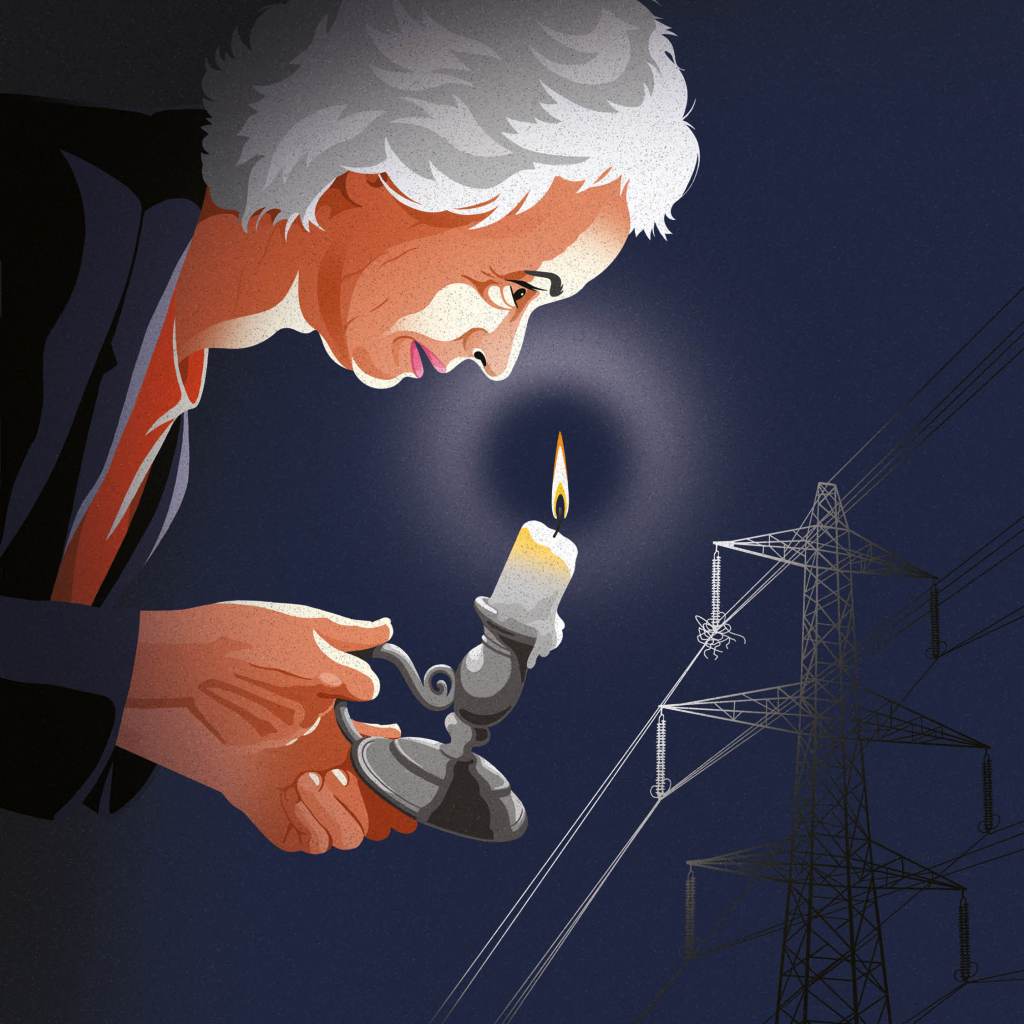Along a twist in the Connecticut River within an old-style colonial Vermont home lives Meredith Angwin, the Jewish grandmother who saw what almost no one else did: the coming downfall of the American electrical system.
Three years ago, Angwin self-published Shorting the Grid: The Hidden Fragility of Our Electric Grid, the first-ever explanation for laymen of America’s labyrinthine, abstruse power markets. Her diagnosis was simple and troubling: when America moved away from the monopoly utility system in the Nineties toward restructured electricity markets, all players were divested from the responsibility of keeping the lights on. As heavily subsidized renewables outbid reliable nuclear and coal plants in the market, the grid would become overly reliant on just-in-time natural gas and imports from neighbors for reliability.
A few months after Shorting the Grid came out, Ice Storm Uri blanketed Texas in darkness. The state’s wind and solar fleets failed over and over again at key junctures and its natural gas pipelines froze, choking its gas turbines when they were most needed. Even if Texas could have imported from its neighbors, none had any power to spare — the storm hit them too.
“Some people said, ‘Well, man, it’s marketing. How did you arrange that one?’” Angwin chuckled when I spoke with her over the summer.
Since then, Meredith has become a quasi-celebrity. She’s appeared on major podcasts like Power Hungry, Odd Lots and Breaking Points to talk about the grid. Her book has begun to win praise from environmentalists and journalists such as Robinson Meyer, the editor-in-chief of Heatmap, a publication covering climate change, who told Ezra Klein that Angwin’s book is “like the best explanation of how electricity markets actually work and the thinking behind them.” Her self-published book has become required reading for anyone concerned about energy in America. It’s a cult hit on Amazon, having risen to the top of its categories several times since publication.
So how did a seventy-eight-year-old grandmother see what few could? And what inspired her, in the last chapter of her life, to write an entire book about it? The answer has deep roots in the American character — our mastery of the practical arts and our naturally democratic instincts for free association.
Angwin was born in Chicago in 1945 to a secular Jewish family. Both her parents had graduated from the University of Chicago and encouraged her intellectual development. Her mother lavished her with books. As a young child, she was preternaturally drawn towards math and science, an inclination bolstered by lengthy trips to the Museum of Science and Industry with her father.
It wasn’t only encouragement that spurred her on. Her parents split when she was young. Divorce muddies the waters of communication; how can a child understand the subtle tensions between parents? Where ambiguity and confusion reigned at home, science governed the world with soothing clarity: what was unknown could be proven or disproven and whatever survived the battery of investigation shone through with a certainty that delighted the young Angwin. She’d found her refuge.
“Science told me how the world really was,” she explained to me.
And then, in 1957 when Angwin was twelve years old, Sputnik tore through Earth’s atmosphere and into space. As the Soviet satellite wreathed our planet, Uncle Sam set about sourcing a new generation of scientists. A young Angwin heeded the call and dreamed of herself among their ranks. But just because Angwin wanted to pursue the sciences didn’t mean she was welcomed with open arms. The STEM fields belonged to the boys — for the most part. In high school, Angwin attended the Chicago Laboratory School, where she ran into a male science teacher who made it his business to drive girls out of his classroom. Angwin felt frustrated and confused until one of her female classmates enlightened her.
“Everybody knows he’s trying to drive the women out of those classes so that he can tell dirty jokes and be more comfortable,” the girl said.
And it worked, except for Angwin. “He might have driven me out, except that I had a certain thing going that I was very fierce about,” she told me. “My family didn’t have much money; I had a scholarship.”
Her savvy friend came from a more prosperous background and could afford to do something else. Angwin had to soldier on. And she prevailed — she graduated in three years. In college, Angwin continued to pursue chemistry, but she also had to take courses in other fields. It was in her physics class that she met the young man who would become her doting husband: George, a hard-scrabble Floridian who had taken time away from UChicago to join the Navy and win better job prospects to pay for his education. George had risen to the top of his class in electronics at the Great Lakes Naval Training Center. They married in 1965 and graduated a year later, sprinting in their caps and gowns to see Meredith’s mother who was dying of cancer. She died shortly after.
Together, Meredith and George would pursue advanced degrees and build a life and family together — a daughter, Julia, and a son, Ilan, along with four grandkids.
Angwin typifies something Tocqueville noticed about Americans. Our country’s democratic impulse toward equality and the American tendency toward practical action led to wide adoption of the sciences. If the American democratic spirit spurred the nation toward wealth and industry, the sciences would be pressed into its service. Absent the Old World’s traditions, Americans were free to sort out what worked and improve what didn’t. Angwin spent the better part of her career focused on the latter.
After Meredith persued PhD, she began work on tackling toxic emissions problems in the coal and gas sector. She even racked up patents in the process. But midway through her forties she found herself tackling brine corrosion issues in geothermal power plants. The dry steam that hisses up from the earth has brine concentrations several times that of sea water and puts great strain on the equipment. The whole affair frustrated her.
“It was a really bad project and I didn’t like it at all — and I didn’t think it was gonna pay off,” she said.
But her work grabbed the attention of a group working on corrosion problems in pressurized water reactors, a species of nuclear reactors. PWRs, she found out, run into similar corrosion problems as geothermal plants. Colleagues focusing on the issue brought her in to work on their brine corrosion simulations. Before then, Angwin hadn’t thought much about nuclear power. But afterwards, she fell in love with it — its power density, its cleanliness, the sophistication of its design. This love for nuclear energy would turn her into an outspoken advocate.
When she and her husband relocated to Vermont in the early 2000s, Angwin had an idea: civilians have no idea what happens in a nuclear power plant. What if she could write a mystery novel set in one that illuminated its inner works for the general public. The novel never came to fruition, but it did put her in touch with Howard Shaffer, a New Hampshire nuclear advocate who agreed to read over some drafts. But there was a catch: if she wanted Howard’s help, she had to attend community meetings with him about the Vermont Yankee nuclear plant. At the time, it was in danger of closing.
The meetings shocked her. The environmental opponents to Vermont Yankee openly passed out eugenicist pamphlets about how radiation exposure would taint the gene pool. They often exaggerated claims about nuclears dangers to the point of disbelief. And they lied without shame. Angwin was appalled.
“They were circulating ideas that are frankly morally outrageous,” Angwin told me.
Someone had to stand up to them. And so Angwin did. As she joined the scrum against the local greens, Angwin launched a blog to circulate ideas from the pro-nuclear position. The blog inspired Angwin to keep up with the news and relay it to everyday people without the anti-nuclear bent so common in the press. In August 2010, a headline popped up in the paper that baffled Angwin: “Grid Operator: Vermont Yankee Not Allowed to De-List from Forward Capacity Market.” Angwin knew those words, but not what they meant in that order. She thought she knew the utility system like the back of her hand, but she couldn’t even interpret a headline. That had to change.
Soon Angwin began to unravel troubling dynamics in the electrical system. No longer the straightforward province of monopoly utilities who owned the poles, wires and power plants that brought power to the American public, major portions of America’s electricity system had been restructured into power markets that functioned like auction houses in which power plant owners bid to supply power to the grid. The effort to form these markets flew under the banner of “deregulation” and hoped to make room for the Davids in a world of state-regulated Goliaths. The pursuit was “reliability at least cost.”
But nothing of the sort happened. When Angwin began her research she discovered a labyrinthine world of meetings between grid operators, Regional Transmission Organizations (i.e., power market areas), and providers, from which the public and the press is banned; staggeringly more regulation to keep the system running than under the monopoly model; dizzying market structures; and a dense network of insiders who were no longer held responsible for keeping the lights on. Angwin says in her book “Tacitus described Roman conquest as ‘They make a desert and then call it peace.’ I would describe the RTO areas as ‘They reward their favorites and call it a market.’”
After four years looking into how the electricity business had changed, Angwin took another five years to write Shorting the Grid. Her core insight is this: power markets possess incentives away from reliable, cheap power and toward blackouts and big power bills. At base, the markets prefer volatility to stability, in keeping with an abiding sociological fact: traders love volatility. Unfortunately, what’s good for power traders isn’t necessarily what’s good for the country.
Angwin learned that New England’s auctions for power are split in two: energy and capacity. Energy auctions happen five minutes ahead of the provision of supply to meet demand on the grid. In energy auctions, the low-priced units get picked first and all power plants get paid the “clearing price,” i.e., the same price as the highest of the low-price plants chosen.
Capacity auctions are for timetables farther out in the future than energy markets. Power plants get paid for being available when the grid needs them, but that doesn’t mean they show up. In cold weather, gas pipelines often freeze, denying gas plants their “just-in-time” supply. Or, in the case of renewables, they just can’t be made reliable, as some solar developers have recently admitted. In neither of these auctions is reliability prized — the markets are “neutral” to promote “fairness” in competition.
These auctions hurt what are called “baseload power plants” but encourage natural gas plants. Unlike nuclear or coal plants, which are built to run at the same level most of the time and provide the “base” power “load” to meet demand, natural gas turbines ramp up to meet demand as it rises and switch off as it falls. Since power markets were induced in the 1990s, natural gas has risen to nearly 40 percent of America’s electricity consumption. And while switching from coal to gas has been a boon for lowering emissions, there’s an important drawback: natural gas plants don’t store their fuel onsite; they are reliant on “just-in-time” fuel supply from pipelines.
Markets also enabled another power source: renewable energy from wind and solar. Now that individual power plants could bid into the power market, renewables began to flower in power markets nationwide. By 2021, 80 percent of renewables sat in RTOs. This served to increase volatility as renewables produce power intermittently, making the rest of the system work around their spotty power production. Natural gas, with its fast-acting turbines, proved the ideal partner. But Angwin noticed something else: heavily subsidized renewables made it almost impossible for baseload power plants to stay in business. Wind and solar can bid into the grid at a cost of zero or below, but still make money via their subsidies. Other power plants, which aren’t subsidized (but are reliable), then lose money. And a fictitious signal is sent to the market: it needs more renewables and less baseload, because renewables make money while baseload dies.
Lastly, Angwin saw another troubling problem with power markets. If no one is responsible for reliability and governments continued to pursue aggressive renewables-only climate policy, and the subsidies from those policies continued to kill off reliable electricity generation, then more regions of the country would find themselves without enough power. Often, various states and regions assumed that their neighbors would have enough in reserve to bail them out of a hard time. Angwin feared that if everyone pursued similar policies, then more and more of the country would be expecting power from neighbors that just wasn’t there.
Angwin coined a term for this bundling of issues: “the fatal trifecta,” which she defined as “overdependence on 1) renewables, 2) just-in-time natural gas, and 3) imports from your neighbors.” This dynamic, she warned, was beginning to make the American electrical grid fragile. On a power grid, supply and demand must be reconciled instantaneously every microsecond of every single minute of every single day of every single week, month, year and so on. The more volatile a grid becomes, the less capable of reconciliation it becomes. And when supply and demand get out of tune, blackouts roll.
At first, Meredith’s work was met with skepticism. What was with the granny with a self-published book? And why did she think she knew better than everyone else? After all, Shorting the Grid militates against the prevailing tropes about the efficacy of markets, the cheapness of renewables, and the technical myopia of climate policy. But, as Mark Nelson, the director of the Radiant Energy Group and internationally recognized energy expert, told me, “Meredith’s book was loudly denounced by motivated energy professionals, but each new crisis in electricity markets finds fewer detractors and more evangelists for Shorting the Grid.”
Indeed, America’s deteriorated grid has made Angwin look like a prophet. Texas spent the better part of this past August on the brink of blackouts. According to energy analyst Brian Bartholomew, Texas’s power market saw successive days at over $1 billion in market costs. PJM, the largest power market in the country, warned that the reliable power plants in its footprint are all marching towards closure by this decade’s end. PJM warns that up to 40 GW (or 21 percent of its installed capacity) of its existing generation — enough to power 30 million households — is at risk of retiring by 2030.
This is bad news for PJM’s neighbors, especially MISO, which relies on PJM’s spare capacity for when its renewables fleet underperforms. And Hydro-Québec, upon whose power both New York and New England’s grid operators have come to rely on even during tough winter months, now worries it has oversold itself to neighbors. Ontario, which sold Québec the winter power that allowed the French-Canadian hydro juggernaut to stabilize the American Northeast, has ended its winter power contracts with Québec. Natural gas continues to entrench its position as America’s guarantor of electric reliability.
In other words, the fatal trifecta is mushrooming into a full-blown reliability crisis. Even the commissioners at the Federal Energy Regulatory Commission are beginning to speak up. Earlier this year, all four commissioners testified before the Senate that America is hurtling towards calamity in its power sector. “This problem is coming. It’s coming quickly,” commissioner Mark Christie told the Senate. “The red lights are flashing.”
If only more of the current administration had eyes to see it. Biden has jumped headlong in doling out hundreds of billions of dollars to renewable energy projects — in perpetuity — while incentivizing mass adoption of electric vehicles, destabilizing supply while increasing demand. The Environmental Protection Agency is putting new power plant emissions rules into place that several of the grid operators in the country have spoken out against, saying the rules will shutter much needed reliable power plants. And the Department of Energy’s Jigar Shah recently described the reliability threat posed by over-building wind and solar as a “rumor.” A week later, the North American Reliability Corp., the nonpartisan non-profit dedicated to monitoring the grid’s integrity, ranked current energy policy as the number one threat to the grid.
But historically, Americans have conquered our challenges through our genius for free association. Tocqueville “often saw American make great and genuine sacrifices for the public” and noticed many times that “when needed, they almost never fail to lend faithful support to one another.” Who embodies that more than Angwin, who, after spending her life improving our country’s industrial capacity has dedicated her winter years to democratizing shadowy intricacies of the power system so that we might better govern it for all?
Yet the real question is whether or not Angwin is one of a dying breed. It’s no secret that our economy has shifted away from atoms and towards bits. Tradespeople are in short supply and many who study in STEM fields move into the financial sector after receiving their degrees. And as we settle deeper into partisan acrimony, the democratic impulse that has threaded itself through Angwin’s life dwindles among us. A bright American future has more Meredith Angwins in it, not fewer.
This article was originally published in The Spectator’s November 2023 World edition.























Leave a Reply